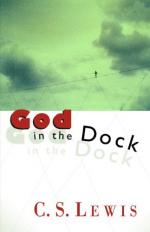
|
| Name: _________________________ | Period: ___________________ |
This test consists of 5 multiple choice questions, 5 short answer questions, and 10 short essay questions.
Multiple Choice Questions
1. How does Lewis suggest that higher animals might be able to achieve immortality?
(a) By God's intervention.
(b) By becoming part of the family of man.
(c) By a process of selection.
(d) By evolving larger brains.
2. Lewis admits that his earlier writing about the pain of animals was which of the following?
(a) Illogical.
(b) Crude.
(c) Unfinished.
(d) Speculative.
3. What mistake does Lewis claim that Pittenger made in critiquing his books?
(a) He left out key arguments.
(b) He was uninformed on the subject matter.
(c) He misinterpreted the scripture.
(d) He didn't factor in the intended audience.
4. According to Lewis, what, besides humans, experiences pain?
(a) Animal stages.
(b) Nothing.
(c) Higher animals only.
(d) All animals.
5. What element of Christianity does Lewis specifically cite as seeming absurd to scientific thought?
(a) Miraculous healing.
(b) God having a son.
(c) The holy spirit descending to the world.
(d) The resurrection.
Short Answer Questions
1. If Jesus' claims about himself were false, he would best be considered which of the following?
2. Which of the following is not a good use of apologetics, according to Lewis?
3. What was Lewis' intent in his original writings about the pain of animals?
4. In Part I, Essay 1, "Evil and God", Lewis states that according to dualism, why is the concept of good itself good?
5. The philosopher that Lewis responds to in Part I, Essay 23, "Must Our Image of God Go?" holds what position?
Short Essay Questions
1. What is the theory of dualism?
2. Why does Lewis believe that the gospels are not legend?
3. What argument does Lewis make to suggest that science incapable of invalidating religion?
4. Explain Lewis' argument that science does not undermine the occurrence of miracles.
5. Why does the answering of prayers not always necessitate supernatural intervention?
6. Explain the way that Lewis states that probability judgments of events in Christianity should be made?
7. How did Lewis' Socratic Club operate?
8. How is Christianity transmitted, according to Lewis' writings in Part I, Essay 13, "On the Transmission of Christianity"?
9. What does Dr. Pittenger say about Lewis' arguments in his earlier works?
10. Why does Lewis believe that pain is evidence of the existence of God?
|
This section contains 694 words (approx. 3 pages at 300 words per page) |

|




